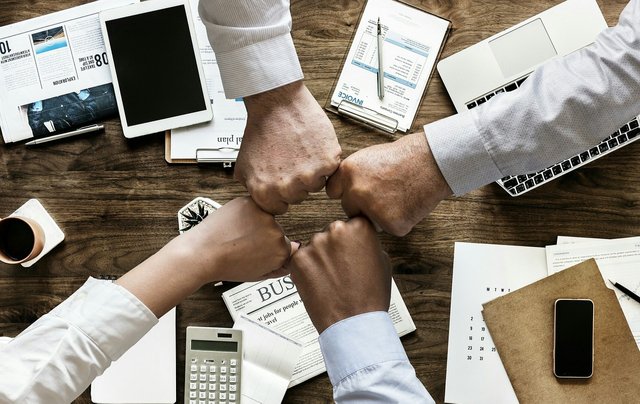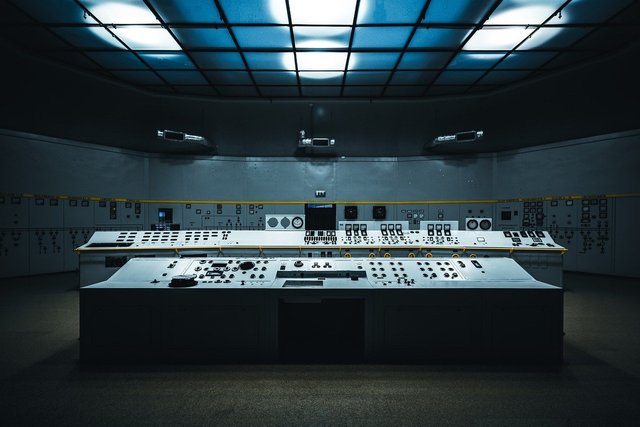Can Blockchain end corruption in developing countries
The world is rift with corruption and they are even much in developing countries where there isn't more technological innovation and as such some manage to do things and escape it because lack of proper advanced technologies are not available or used for security this makes it much easier for this one's to easily do things and escape when they are not advanced technological security system it greatly jeopardize the place and make corruption to be more rampart as there isn't a strong system that ensures that corruptions are out in check making many wonder in truly there is a way to end corruption completely especially in developing countries where people seem to do anything they want and get away with it, could there be a system that helps to provide accountability, well the is an idea that blockchain could solve this.
It seems possible really for blockchain to end corruption in developing countries the nature of blockchain ensures that this is a real possibility and the potential for it to do this is clearly evident due to the feature of blockchain it might not really end it completely as one might hope but it will help in reducing it, yes blockchain features ensures that it's very possible to aid in reducing corruption no doubt but to end it I believe blockchain would have to work hand in hand with other things to a achieve and it might not be able to do it alone despite how great it is, it might probably need to be integrated with the existing security system of the country amongst other things that ensure law and order is maintained if it's to completely eradicate corruption.
Blockchain alone won't be a standalone solution but there are different facets that it would improve which would help to improve security of the country and help reduce corruption and ensure accountability or that things are put in check, blockchain can help to enhance both accountability and transparency in this developing countries which would help in curbing corruption and improve efficiency, these are some areas blockchain could touch which will no doubt help to combat corruption in developing countries true blockchain can't be a standalone solution in ending corruption but it sure makes a difference and I would like to discuss some ways blockchain could help curb blockchain in developing countries below:
One way Blockchain could potentially help to curb corruption is through transparency and accountability, this are the core features of blockchain that this countries could leverage on to help improve the system and this transparency and accountability is due to the fact blockchain provides a public ledger where transaction are recorded, the public ledger is decentralized and open in a way that it's accessible to everyone and this is what ensure the tamper resistant nature of the blockchain, so a transparent open ledger system ensures accountability which could be potentially leveraged on by developing countries in curbing corruption. We might wonder how really can the blockchains transparency and accountability help to curb corruption?
Well with a transparent network every transaction made would be visible to all, everyone could see it since the blockchain operates on a public ledger and this could really be utilized by developing countries as it would help to ensure that the right authorities are seeing every transaction made and would easily see any dubious high volume transactions the time it when initiated, processed and completed. When those who involve in dubious things and make illegal transactions know that everything they do would be visible to authorize parties it would make them think twice and this is how transparency of blockchain could potentially help to discourage those who involve in corrupt practices, no doubt the this is really something that could help.
And blockchain records provides an auditable records that is the accountability that comes with blockchain, it's easily audited due to its immutable nature, datas on blockchain can't be manipulated or changed by any third party they are a permanent record of any data entered and this ensure for easy auditing, meaning that once a transaction is made the blockchain network enjoys that there is a permanent record meaning even after 20 years one can still check the record and trace the transaction at all times any transactions on blockchain could be audited which means that every financial transaction are easily subjected to review which would make many who involve in corrupt deals to think twice before doing so as the records would always be on blockchain and this would really help to curb corruption, so that's one way Blockchain can with transparency and accountability help combat corruption.
Blockchain also helps to curb corruption through reduction of intermediaries through smart contract agreements are automatic meaning there is no need for any third party or intermediary to help facilitate transaction since the blockchain through smart contract ensure for a self executing agreements things such are funds and other necessary deals relating to finance are easily carried out based on a predefined rule and let's say it's a fund that's needed for a specific purpose through smart contract this funds could be released automatically at the time it's needed without needing to pass through any intermediary, most times the missing funds are often due to too many middle man standing in between the funds getting to its desired destination but with the reduction of intermediaries it helps to potentially reduce corruption.
Too much reliance on intermediaries always give rise to possible corruption, the more the middlemen in between funds the more likely it is to be absconded but with blockchain acting to reduce the reliance on intermediaries it helps to potentially reduce corruption because their is always chances of intermediaries who are prone to corruption but with blockchain direct payments is made possible meaning no intermediary needed to facilitate transaction there is direct transaction between entities this is what blockchain truly makes possible and with this it gives room for little or no corruption, so reducing intermediary and facilitating direct peer-to-peer transactions between individuals and entities is one way blockchain potentially would help curb corruption in developing countries.
Blockchain helps to ensure that intermediaries are completely bypassed and with it the corruption that comes with it and what this means is that things such as government aid could reach their desired target, most times we hear in the news that government just released aids to help those in need and yet they will never receive the aid because by the time it passes through all the intermediaries to get to the poor masses in need of it one of the many middlemen would have embezzled the funds so with blockchain this could be really mitigated and funds won't need to be passed through any middleman but straight to the intended destination which is a great way corruption can be greatly reduced by blockchain.
Blockchain features also ensure that it could enable the easy tracking of public funds and this kind of budget transparency would help to ensure that corruption is curbed especially corruption in government, all too often we hear of national budget in our respective countries often in billions of dollars and this public funds are allocated to several factors and at the end of the day it's believe this money is used up in the betterment of this sector say education sector or health sector but then at the end of the day there is little of no improvement in this respective sectors making the masses to wonder really if this money is really going into this sectors as the government claim, the allocations and spending of government and how they use public funds often go unchecked but blockchain could help to reduce this.
Blockchain transparent nature would greatly help to ensure that the allocated funds for any sector as part of the national budget the citizens would see clearly how this funds allocated to a certain sector is used to further the sector and improve it, there would be a transparent record of government spending in that sector for the year helping the masses see really if government are doing what they say they would and ensure that there is no misappropriation of public funds using the guise of budget to abscond public funds because all too often after the big national budget in most developing countries there is little of no improvement in that sector making one really wonder if the funds is really been used to further the sector, in most developing countries where there isn't a transparent system that ensures accountability funds misappropriation is one way public officials used up public funds but ofcourse with blockchain that wouldn't be so as everything would be recorded and we would see just how they used up the billions in any sector and check truly the validity of their claims.
But today in most developing countries where there isn't any transparent system we simply believe that any money they said would be used up is being used for the betterment of any sector as there is no way to check for fact if it's true or not but ofcourse blockchain helps to solve this as the records are updated in real time making it easy for the masses to see how the government use funds, tax payers would see just how their funds are used by government making it much easier for government officials to be held accountable for squandering public funds since there is a public record of this and any aid either from foreign state would be logged into the blockchain and everyone would see how government allocates funds or resources to its civilians. So that's just another way that blockchain could help ensure that corruption is curbed in developing countries.
Blockchain could also potentially ensure that corruption in land and property isn't there anymore, all too often in most developing countries or even in developed countries too we often hear cases of where two people are in a battle of who owns a property sometimes someone is said to have sold another person's property and then this would bring issue in the future and we would have land ownership dispute and property dispute about who truly owns what because there is no clear records but ofcourse this kind of problem is easily solved by the immutable nature of blockchain technology, how so, we might wonder.
The blockchain network is immutable this means that the records on it are immutable meaning they remain unchanged at all time and the problem faced in many developing countries regarding land titles and property right are greatly reduced, with blockchain there is no need for discussion about who owns what or not because before buying a property no one would deceive you into buying something that's stolen or that's not theirs to begin with, you can always check the public ledger to check truly who the true owner of a property at all time this will hence help to reduce corruption in land administration in many developing countries and help to ensure there is proper legal right as to who owns a particular property making it difficult for fraudulent individuals to scam people with fake property.
With blockchain immutable records it ensure that ownership of land and property are very secure and clear and there is no doubt about the true owner of a property as there would be clear and unchangeable record on blockchain as to who made purchase and have the legal claim to a land or any property and the time the property was purchased and the name the property is in and the immutability of blockchain ensures that this records can't be tempered with at any time by anyone at all, and with with frauds and corruption prevalent in developing countries as it concerns lands and property ownership would be combated. Blockchain immutable records would help to ensure that bribery common in land dispute and property disputes are never there to begin with and there won't be an fraud in any property transaction which is really the beauty of blockchain technology and how in this way it can also help end or combat corruption in developing countries.
So maybe blockchain may not really completely put a solution to all the corruptions seen in the world today especially in developing countries but the fact that it can help reduce it, that in itself is undeniable and without a doubt and this it can do by ensuring transparency and accountability, removing intermediaries, tracking public funds which help ensure government accountability and immutable records which helps in land and property records to ensure no fraud in property transaction as well, so these are some ways blockchain could make a marking difference in reducing frauds and corruptions seen in developing countries.



https://x.com/frank_anayo/status/1857186119093481707?t=inOvX1MVFDwGxdBgUspFXw&s=19
Upvoted! Thank you for supporting witness @jswit.
Note:- ✅
KINDLY JOIN THE BURN PUSS PROJECT AND EARN MORE REWARDS
Regards,
@jueco